
It is important to choose the right rose water for your hair to get the most out of it. With so many different options on the market, it’s important to know what to look for to ensure you’re using a high-quality product that gets what you want. Here are some tips to help you choose the best rose water for hair care routine:
1. Understanding the Different Types of Rose Water
Rose water can be categorized into two main types based on the method of extraction:
- Pure Distilled Rose Water: This rose water is made by steeping fresh rose petals in hot water. It is the highest quality and strongest rose with all natural oils and beneficial properties. Pure, distilled rose water contains no additives, preservatives, or artificial fragrances, making it the ideal choice for hair care.
- Synthetic Rose Water: Artificial rose water is made by mixing chemicals with rose fragrance or rose oil in water. Although it has a pleasant scent, it lacks the benefits of pure rose water and also contains additives that can irritate the scalp or scalp If you are looking for real benefits, avoid artificial rose water.
2. What to Look for in High-Quality Rose Water
When shopping for rose water, consider the following factors to ensure you’re getting a high-quality product:
- 100% Pure and Natural: Look for a label that says “100 % pure,” “organic,” or “natural.” Ingredients should be simple, preferably with just one ingredient: rose water. Avoid alcoholic products, fragrances or preservatives, as these can dry out or irritate the hair and scalp.
- Origin and Source: The quality of rose water can vary depending on where the rose is obtained. The best rosewater usually comes from regions known for quality roses, such as Bulgaria (Bulgaria Rose), Morocco (Rosa Damascena), or Turkey These regions have a long and repeated tradition of rose farming no their products are of high quality.
- Packaging: Rose water should be stored in a glass bottle in the dark to protect it from light and maintain its potency. Avoid plastic containers, as they can leach chemicals into rose water, reducing its effectiveness.
- Certifications:If possible, choose rose water that is certified organic product or has other credentials such as cruelty-free or fair trade. These certifications ensure that the product is free of harmful chemicals and that ethical practices were followed during the manufacturing process.
3. Organic vs. Synthetic Rose Water: Understanding the Difference
- Organic Rose Water: Organic rose water is made from roses grown without the use of pesticides, herbicides or synthetic fertilizers. This ensures that the final product is clean and free of harmful chemicals. Organic rose water is expensive, but offers excellent benefits, especially for those with sensitive skin or dry hair.
- Synthetic Rose Water: Synthetic rose water can produce synthetic products that smell like roses but do not provide the same benefits. These products usually contain preservatives and alcohol, which can dry out the hair and scalp, and can cause irritation or even damage. Synthetic rose water may be cheaper, but it is generally less effective and not recommended for hair care.
4. Tips for Storing and Using Rose Water
To maintain the quality and effectiveness of your rose water, follow these storage and usage tips:
- Store in a Cool, Dark Place: Keep your rose water in a cool, dark place, away from direct sunlight and heat. This helps preserve its potency and extend its shelf life.
- Use Within 6-12 Months: For optimal results, use your rose water within 6-12 months of opening. Over time, the potency of the natural ingredients may diminish.
- Patch Test Before Use: Before applying rose water to your hair or scalp, perform a patch test on a small area of your skin to ensure you don’t have any allergic reactions.
By choosing the right rose water and following these guidelines, you can ensure that you’re getting the most out of this natural remedy, enhancing your hair’s shine and overall health.
